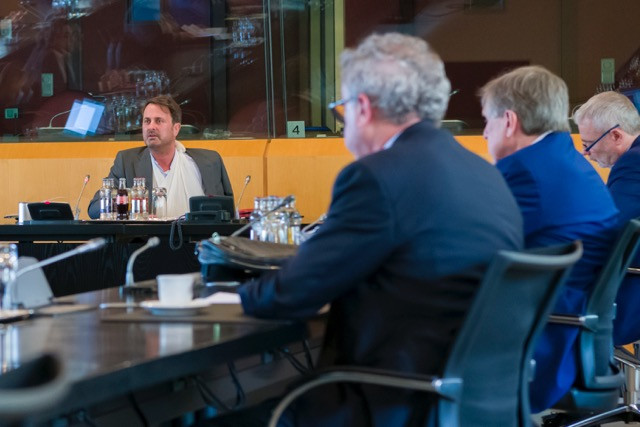The meeting between the government and leaders of the OGBL, LCGB and CGFP unions, as well as representatives from Horesca and the chamber of employees, had been prompted by a letter sent by the unions earlier in the week. They had been angered at a lack of consultation regarding the so-called “pandemic law” which the government is currently drafting--of which a first draft was presented to parliament on Wednesday--which will replace the current state of emergency when it expires on 24 June (three months after its introduction).
The letter, entitled “And now, Mr. Prime Minister”, had said that although the pandemic law will impact the fundamental rights of all citizens, the government had “systematically and shamefully ignored the representatives of wage earners.”
Prime minister Xavier Bettel (DP) led the government delegation that included the two deputy prime ministers Dan Kersch (LSAP) and François Bausch (Déi Gréng) as well as finance minister Pierre Gramegna, family minister Corinne Cahen and minister for small and medium-sized enterprises Lex Delles (all DP) and minister of agriculture Romain Schneider and minister for the economy Franz Fayot (both LSAP).
A further meeting with the unions to discuss details of the bill has been scheduled from Tuesday 19 May, this time including minister of health Paulette Lenert.
The trade union representatives also discussed elements of the government’s exit strategy. OGBL president Nora Back said that “maintaining employment and purchasing power, and even strengthening it,” should be paramount. This would require the extension of short-term unemployment measures beyond the crisis. But she also had more specific suggestions, including the distribution of vouchers to residents and cross-border workers to use at hairdressers or restaurants--both sectors that have suffered significantly from the 9-week confinement period.
Extend short-term unemployment
The LCGB would like an improvement to the short-term unemployment scheme, including an increase in the amount reimbursed from 80% to 90% and an upper ceiling of five times the minimum wage, as opposed to the current limit of two and a half times. Union president Patrick Dury made the case for alternative models to unemployment especially in companies where recovery is slower. He wants more investment in public works and greater mobility for workers and is also arguing in favour of the setting up a so-called conversion cell similar to that which helped the grand duchy emerge from the steel crisis of the 1970s.
The government also had a separate meeting with leaders of employer’s groups including Nicolas Buck from the UEL business association, Michèle Detaille from industry federation Fedil and Fernand Ernster from the CLC which represents the trade, services and transport sectors, Tom Oberweis from the Chambre des métiers, as well as Luc Frieden, president of the Chamber of Commerce.
A possible tripartite meeting between government, employers and trade union representatives has been scheduled for 10 June. “The Prime Minister has set this date because he thinks that by that time he will have more figures on the recession and the impact of the health crisis on finances,” said Nora Back. Patrick Dury said the meeting could also be bipartite “if a tripartite is not justified.”
Despite Bettel’s suggestion that the tripartite could be enlarged to include other social partners, both the major union leaders are urging for the model to be retained even though it was effectively knocked on the head by UEL president Nicolas Buck last year. “It’s useless [to enlarge the tripartite]. We have an institutionalised and functioning social dialogue,” said Back.
The unions argue for a small country like Luxembourg, the only effective way to face a crisis like the coronavirus is through dialogue between government, trade unions and employers, “under the direct aegis of the Prime Minister,” said Patrick Dury. “The tripartite model was born in the years 77-78 and is proven. This is not the time to change, when 44% of the country’s workforce is unemployed,” the LCGB president concluded.
